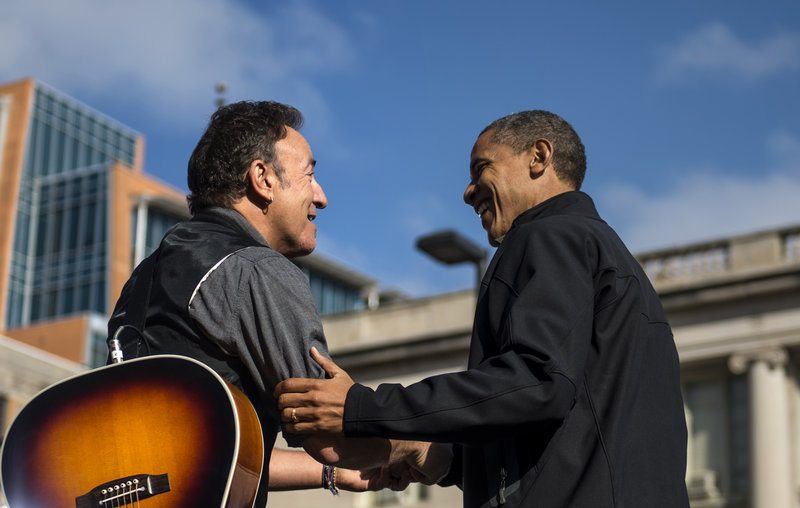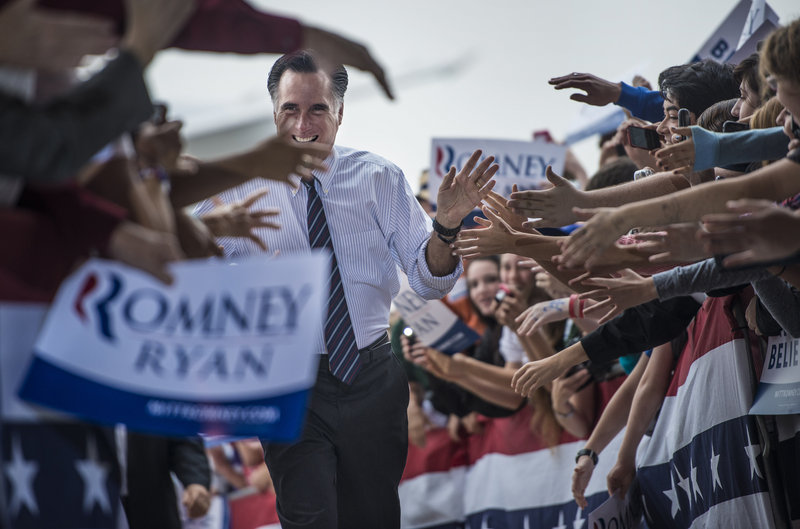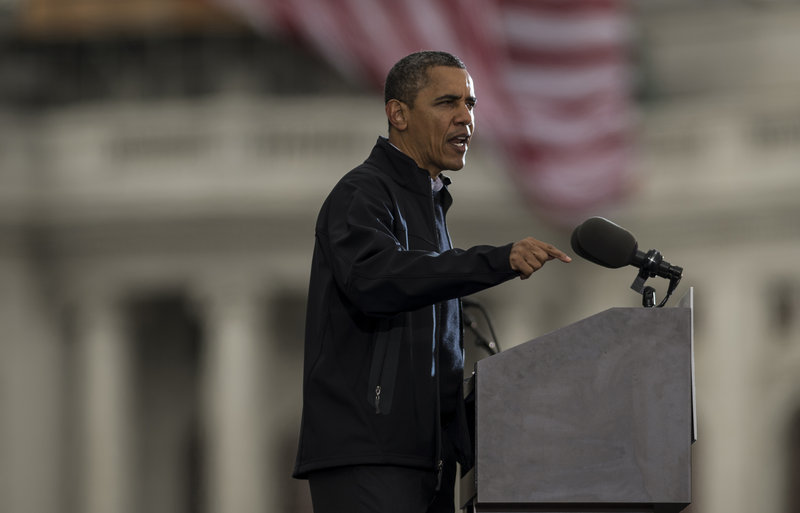The White House the prize, President Barack Obama and Mitt Romney raced through a final full day of campaigning on Monday through Ohio and other battleground states holding the keys to victory in a tight race. Both promised brighter days ahead for a nation still struggling with a sluggish economy and high joblessness.
“Our work is not done yet,” Obama told a cheering crowd of nearly 20,000 in chilly Madison, Wis., imploring his audience to give him another four years.
Romney projected optimism as he neared the end of his six-year quest for the presidency. “If you believe we can do better. If you believe America should be on a better course. If you’re tired of being tired … then I ask you to vote for real change,” he said in a Virginia suburb of the nation’s capital.
Obama held a slim advantage in national and battleground polls going into Election Day as the candidates and their campaigns braced for a day of intense battle — and the legal fights that may follow.
A Washington Post-ABC News tracking poll showed Obama at 50 percent to Romney’s 47 percent. That is Obama’s best showing since July and a reversal of the three-percentage-point edge Romney held last month.
Elsewhere, new polls showed the president up by small margins in Ohio, Virginia and New Hampshire, three states that could determine the election by themselves.
The presidency aside, there are 33 Senate seats on the ballot Tuesday, and according to one Republican official, a growing sense of resignation among his party’s rank and file that Democrats will hold their majority.
The situation is reversed in the House, where Democrats made no claims they were on the verge of victory in pursuit of the 25 seats they need to gain control.
For both presidential campaigns, Monday was filled with the hard work — and the head fakes, rumors and spun-up bravado — that are traditional on an election eve. Volunteers called numbers they’d already called. They rapped on doors they’d already knocked on.
Romney announced that he would campaign into Election Day, visiting Pennsylvania and Ohio, in a gesture of either confidence or concern.
“If anyone wants to know where the energy is — if anyone out there that’s following American politics wants to know where the energy is — just come right here in this room and you’ll see it,” the Republican told a crowd at George Mason University in Fairfax County, Va.
Obama finished his campaign on Monday with rallies in Wisconsin, Ohio and Iowa. His traveling aides wore fleeces with his 2008 campaign logo and talked confidently of the president’s multiple paths to winning 270 electoral votes a second time.
In Madison, Obama rallied a crowd of 18,000 in front of the state Capitol, saying the time was nigh for his supporters to help keep him in the White House.
“If you’re willing to work with me again, and knock on some doors with me, make some phone calls for me, turn out for me, we’ll win Wisconsin,” Obama said. “We’ll win this election. We’ll finish what we started.”
In two key swing states, the parties spent Monday battling over voting procedures. In Florida, the state Democratic Party asked a judge to order an extension of early voting, after an early-voting center near Miami shut down temporarily on Sunday with a line outside.
Afterward, Florida Democrats said, election officials in South Florida made it easier to cast in-person absentee ballots. The party said officials in the heavily Democratic counties of Broward, Palm Beach and Miami-Dade were allowing voters to cast absentee ballots Monday.
In Ohio, there were ominous signs that the election might not be settled for days. On Monday, a federal judge there set a hearing for Wednesday to decide how the state should count certain provisional ballots.
These ballots, which are issued to voters whose eligibility is in question, are set aside and counted later. If Ohio’s vote comes down to these ballots, the outcome will be delayed during a 10-day review period.
A look at early-voting data in key swing states seems to show a Democratic advantage — although not nearly as big as the one Obama enjoyed four years ago.
In Iowa, Democrats won the early vote by 18 points in 2008. This year, they lead it by 10. In Florida, the Democrats’ four-point edge is less than their nine-point margin of four years ago.
The pattern repeats in many key states, where Democrats’ early-vote edge is four to eight points less than it was in 2008. Given that Obama won the popular vote in 2008 by about seven points, that would suggest a neck-and-neck race.
By Monday, the most expensive general election in U.S. history was winding down. In some states, political commercials were airing at a rate of more than 50,000 spots a day, according to media tracking data. In some places, in fact, there was no more room on the air.
So, without ad slots to buy, conservative groups began placing commercials in deep-blue states such as California and New York.
On Tuesday, the country’s first polls will open at 6 a.m. in some East Coast states, including Virginia (they open an hour later in Maryland and the District). The last ones will close 19 hours later, at 8 p.m. local time in Alaska’s Aleutian Islands.
By then, the nation might finally know the outcome. This is the basic math of the race: Seven states are considered tossups. To win the White House, Romney needs to win at least four of them, including the biggest, Florida.
Obama has more options. He could secure reelection with just one of these states – Florida. Or he could win with several combinations of two, such as Ohio and Wisconsin, or Ohio and Virginia. This assumes Romney doesn’t pull off an upset somewhere unexpected, such as Pennsylvania.
“We’ve said we see many different paths to 270 (electoral votes), and all those different paths are still there today that we saw a year ago,” David Axelrod, a top strategist for Obama’s campaign, told reporters Monday. “That’s the difference between the campaigns.”
On Monday, the two campaigns did what they had been doing for months: calling and canvassing. They weren’t giving up.
“After the ninth, 10th, 11th call, I really feel for them,” said Antonette Smith, a volunteer in Colorado for the conservative group Americans for Prosperity who had been dialing up beleaguered swing-state voters all morning. It was Smith’s last day at an “action center” in a suburban office park. She said she came as much for her own sanity as anything else.
Smith, 50, who was laid off in May from a health-care marketing group, said it was too hard to sit home alone for the campaign’s final hours. She thinks this election could turn the economy around.
“I want to be with people. This is very personal for me,” Smith said, her eyes filling with tears. “My daughter needs a new pair of jeans.”
In Wisconsin, Romney volunteer Dick Farrell went looking for votes in the oldest-fashioned way: knocking on doors. He had a clipboard with the names of likely Romney voters. And he had a script in which he was supposed to ask whether someone had voted, and if not, what time Tuesday they planned to head to the polls.
Send questions/comments to the editors.




